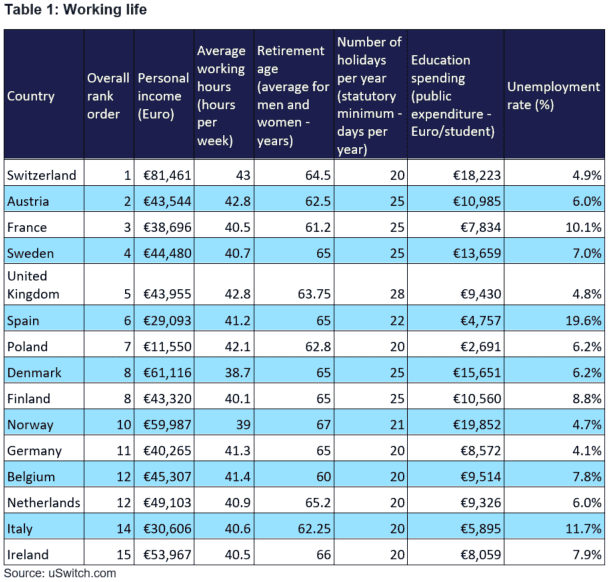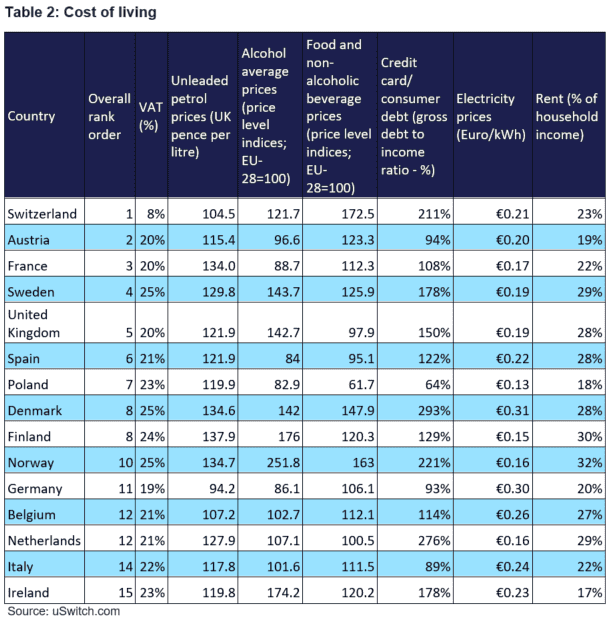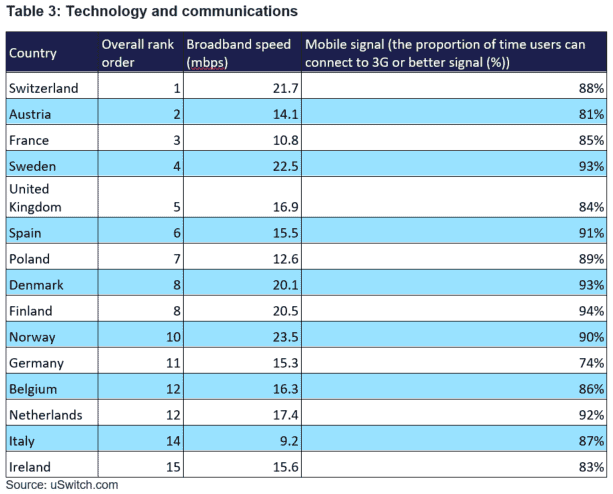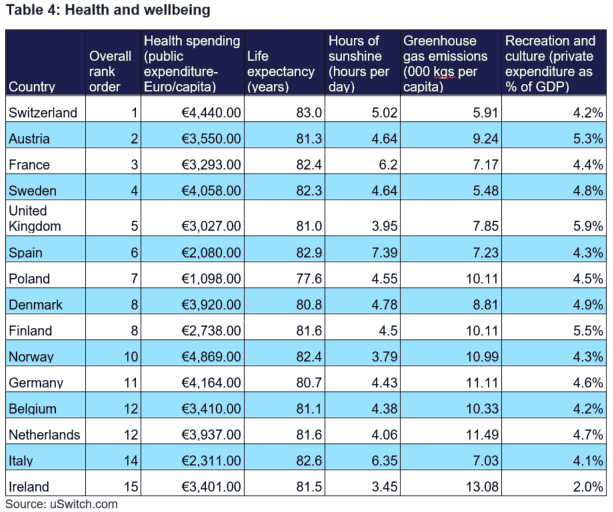Ireland bottom in European Quality of Life Index
Republic of Ireland comes last in latest Uswitch Quality of Life Index – let down by poor mobile signal, lack of sunshine and high retirement age
Non-EU member Switzerland tops the table with the highest wages, best life expectancy and fast broadband
The UK fares well in fifth place with cheap food, the highest level of paid annual leave, and a low unemployment rate
France (3rd) beats its neighbour, the UK (5th), and takes the bronze medal – boosted by long sunny days and a younger than average retirement age
Old rivalries run rife across the continent with Spain (6th) scoring a roaring victory over Italy (14th), meanwhile Belgium and the Netherlands tie in 12th.
The Republic of Ireland has been revealed as the worst place to live in the latest European Quality of Life Index from Uswitch.com, the price comparison and switching service. The study looks at the 15 largest European countries by GDP and ranks them against 20 factors commonly associated with quality of life.
Ireland is let down by having the least amount of sunshine per day (3.45 hours) and the second highest retirement age (66 years). The country is one of the worst for mobile signal coverage with mobile users only able to connect to 3G or better signal 83% of the time, is tied last for the least amount of statutory holiday days (20 days) and at 23% has one of the highest VAT rates in the study. But it’s not all doom and gloom for the Emerald Isle: it has the cheapest rent (17% of net household income), personal income is fourth highest in the study at €53,967 and it ranks fifth out of 15 for average working hours (40.5 hours per week).
Switzerland is living the high life in first place – topping the table for personal income at €81,461 and with the lowest VAT at 8%. The non-EU member benefits from the longest average life expectancy at 83 years – above the UK at 81 years and Poland at 78 years. Switzerland also boasts the third fastest broadband speed in the study, at an average of 21.7mbps, cementing its standing as a digital leader.
However, healthy incomes and longer lives don’t tell the full story. People in Switzerland have the longest working weeks (43 hours per week) and tie at the bottom of the table for the lowest number of paid holiday days in a year (20 days).
By contrast, Poland, which ranks seventh in the study, has the lowest personal income (€11,550); but if you’re looking for a bargain, it’s the place to go, with the cheapest alcohol, food, electricity and petrol, plus the lowest level of consumer debt and second lowest rent.
The UK ranks in fifth place with low food prices – although they are rising rapidly – and third lowest unemployment rate (4.8%) in the study. The UK also comes top in the study for spending on recreation and culture (5.9% of GDP) meaning that despite our lacklustre levels of sunshine (3.95 hours a day) people are still having a good time and enjoying the many cultural highlights the country has to offer.
Brits will be pleased to know that they beat many of their Scandinavian neighbours. Denmark (8th), Finland (8th) and Norway (10th) slip down the rankings due to higher than average VAT rates, older retirement ages, more expensive food prices and high rent. However, the Nordic countries generally spend more money on education, have shorter working hours and a better mobile signal than the UK.
However, the UK has lost out to one of its oldest rivals: France places third in the study, ranking second for retirement age (61 years), third for hours of sunshine (6.2 hours per day) and fourth for pollution levels (7.17 thousand kilograms per capita). It also scores well on average working hours (40.5 hours per week), compared to the UK which has the second longest working hours in the study at 42.8 hours per week.
Spain (6th) and Italy (14th) are also some distance apart in the rankings. Spain triumphs with cheap petrol (107p per litre), two days’ more holiday than Italy and slightly faster broadband. Belgium (12th) and the Netherlands (12th) share more than just a border, both placing 12th in the study. Belgium has the youngest retirement age in the study – an average of 60 years – and a much lower level of personal debt than the Netherlands: 114% of net income compared to 276%. However, the Netherlands has cheaper electricity (€0.16 per kWh) and much better mobile signal coverage with people able to connect 92% of the time compared to 86% of the time in Belgium.
Tashema Jackson, consumer expert at Uswitch.com says: “It’s great to see the UK holding its own against our European neighbours, especially topping the table for wellbeing factors such as the amount of annual leave we take.
“But we still fall down in many key areas. As a world leader in business and innovation, we shouldn’t be fourth from the bottom for mobile phone coverage. We’re also one of the most expensive places in Europe when it comes to renting a place to live. Combined with a middling personal income score, this can make living comfortably a challenge for many families.
“We can’t promise to make the sun shine longer each day, but the good news is, there are some small things that consumers can do to make a real difference to household happiness. If you’re suffering from patchy calls, check if another provider can give you better signal in your area; switching energy provider can save you up to £491 and takes only 10 minutes; and moving debt to a 0% interest card can provide some much needed breathing room. These steps may not be as drastic as moving to Switzerland but they can make a real difference to UK households.”
Working life
Personal income varies wildly across Europe from €81,461 in Switzerland to €11,550 in Poland. The UK sits comfortably in eighth place with an average personal income of €43,955 (equivalent to £37,505) but fares much better when it comes to the number of people in employment. The UK has the third lowest unemployment rate in Europe at 4.8%, well below Spain (19.6%) and Italy (11.7%) – which have the highest unemployment rates in the study – and just above Germany at 4.1%.
The old adage that a good education leads to a good job rings true. Countries with higher education spending tend to see higher personal income levels. Norway spends the most on education with over €19,000 going on each student over 5 years old, and sees the third highest personal income at €59,987. This is compared to Poland, at the bottom of the table for education spending at just under €2,700 per pupil and at the bottom of the rankings for personal income. The UK ranks just below average on these factors, coming eighth in both, spending an average of €9,400 per student.
However, high wages and job opportunities don’t tell the full story. Average working hours, number of holiday days a year and average retirement age are all important factors in workers’ happiness. The UK and Austria both tie second from bottom when it comes to average working hours (42.8 hours per week), just beating Switzerland which has the longest working week. To help make up for this, UK workers benefit from the greatest holiday entitlement per year at 28 days of paid annual leave. This compares to Switzerland, Poland, Germany, Belgium, the Netherlands, Italy and Ireland who all tie for bottom place on holiday days at 20 days a year. Retirement age also varies across the continent with Belgian workers getting to down tools before the rest of us (aged 60) while the Norwegians work away until the age of 67.

Cost of living
Holidaymakers will be familiar with just how much food and alcohol prices vary across Europe but these variations also have an impact on the cost of living. For the cheapest cost of living, Poland is the place to go – it has the cheapest food, petrol prices and electricity prices.
The UK ranks third for the cheapest place to buy food and non-alcoholic drinks and is a far cry from expensive Denmark and Switzerland. A loaf of bread will set you back the most in Denmark at 51% more than the European average. For the priciest pint of milk head to Norway where it costs 77% more than the standard European price.
The UK nearly tops the table for the most expensive alcohol prices, ranking 11th out of the 15 countries in the study. Taking the lead with the most expensive alcohol is Norway, a whopping 165% more expensive than the European average. The cheapest drinks are further east in Poland at 13% below the average but if you’re after warmer climes then Spain has the second cheapest booze in the study.
Getting around and powering the home also puts pressure on household finances. Petrol prices and electricity prices are both cheapest in Poland at 94.2p and 13 cents per kWh. That compares with Denmark, which has the most expensive electricity at 31 cents per kWh and the 12th most expensive petrol prices at 134p. UK drivers pay average European prices for petrol (119.8p) and electricity (19 cents per kWh), ranking sixth place for both factors.
Underpinning most of these costs is VAT. Top of the table with the lowest rate is Switzerland at 8% and worst is Sweden with 25%. The UK sits at the top end of the table (5th) with a VAT rate of 20%.
Households are also feeling the burden of rising rent and managing increasing levels of debt. On average, Brits spend almost a third (28.4%) of their net household income on rent. Irish households spend the least amount, with only 16.82% of their net income going on rent.
Household debt includes everything from mortgages to credit cards and loans. In the UK, Brits are racking up 150% of their total net income in debt – therefore spending more than they have. Denmark and the Netherlands are the worst faring countries with consumer debt over 250% of their net income.

Technology and communications
Reliable and fast mobile and broadband connections have never been more important for businesses and consumers, but there’s still a way to go before Europeans benefit from 100% connectivity. Although the UK continues to invest in digital infrastructure, it’s clear more still needs to be done: we sit in the middle of the pack (7th) for broadband speeds in Europe, with average speeds of 16.9mbps. This is much slower compared to the highest-ranking country, Norway, which sees average speeds of 23.5mbps – but is a far cry from the lowest ranking country, Italy, with average speeds of 9.2mbps.
The UK is among one of the worst countries in the study for mobile signal, with mobile users only able to access a 3G or better signal 84.2% of the time. This is almost 10% less than the best country for mobile signal, Finland, where consumers can access a 3G or better signal 93.9% of the time. Surprisingly for another world leader in digital innovation, Germany ranked worst in the study with mobile owners only getting an adequate signal 73.7% of the time.

Health and wellbeing
Sunny days and happiness often go hand in hand, but the UK lives up to its reputation for gloomy weather with an average of only 3.95 hours of sunshine a day – ranking third from bottom in the study and leaving many Brits searching for rays of sunshine abroad. This lack of sunshine is possibly why over 300,000 Brits decided to emigrate to Spain in 2015, the highest ranked country for average hours of sunshine (7.39 hours). On the opposite end of the scale and lagging only slightly behind the UK is Norway, with only 3.79 sunny hours a day, and Ireland with the least amount of sunshine in the study at only 3.45 hours a day.
But Brits don’t need the sun to have a good time – 5.9% of UK GDP is spent on recreation and culture, making it the highest ranked country in this category. That’s compared to the Republic of Ireland, where people only spend 2% of GDP on recreation and culture – which places it last in this category.
Pollution, life expectancy and public expenditure on health appear intrinsically linked. Poland places last when it comes to health spending (€1,098 per capita), has the lowest life expectancy (77.5 years) and places 10th out of 15 on pollution (10.11 thousand kilograms per capita). The UK ranks 12th on life expectancy (81 years) and 11th on health spending (€3,027 per capita) but does a little better when it comes to pollution, placing sixth with greenhouse gas emissions of 7.85 thousand kilograms per capita. Surprisingly, Ireland, famed for green hills and fresh air, is at the bottom of the table for pollution (13.08 thousand kilograms per capita) while Sweden takes the top spot (5.48 thousand kilograms per capita). The healthiest nation is Switzerland, with the longest life expectancy (83 years), second highest health spend (€4,440 per capita) and second lowest greenhouse gas emissions (5.91 thousand kilograms per capita).

Find out how you could save over £1,000 a year with Uswitch here.
FOR MORE INFORMATION
Ailene Barr
Phone: 020 3872 5610
Email: ailene.barr@uswitch.com
Twitter: @uswitchPR
Notes to editors
Personal income refers to 2016, exchange rate taken at 31st December 2016 (£1=€1.17197)
Bread and cereals http://ec.europa.eu/eurostat/statistics-explained/index.php/Comparative_price_levels_for_food,_beverages_and_tobacco#Food.2C_beverages_and_tobacco
Milk, dairy and eggs http://ec.europa.eu/eurostat/statistics-explained/index.php/Comparative_price_levels_for_food,_beverages_and_tobacco#Food.2C_beverages_and_tobacco
http://www.un.org/en/development/desa/population/migration/data/estimates2/estimates15.shtml
The Uswitch European Quality of Life Study is an assessment by Research Insight Ltd (www.research-insight.com) of the 15 largest European countries (by GDP) ranked against 20 measures important to quality of life. Data for all measures was obtained through desk research, from reliable public sources, plus a small amount of data modelling. Most of the data was collected from Eurostat and OECD, all data captured for this study was correct as of 12 October 2017. For more detailed information on how to access the relevant information in the below links contact the uSwitch press office. Personal Income (2016) Average annual wages per full-time and full-year equivalent employees https://stats.oecd.org/ USD converted to EUR as data is for 2016, we used 31 December 2016 exchange rates (1 USD=0.95034 EUR) VAT (2017) Link for 13 Countries (excl. Norway and Switzerland) https://ec.europa.eu/taxation_customs/sites/taxation/files/resources/documents/taxation/vat/how_vat_works/rates/vat_rates_en.pdf Link for Norway Link for Switzerland Average Working Hours (2016) Number of hours a full time employee normally works per week. This covers all hours including extra hours, either paid or unpaid. Excluding commuting time and meal breaks. http://ec.europa.eu/eurostat/tgm/table.do?tab=table&init=1&plugin=1&pcode=tps00071&language=en Fuel Prices (September 2017) Price per litre for unleaded 95 octane, average of mid-month prices http://www.theaa.com/driving-advice/driving-costs/fuel-prices Retirement Age (2014) Retirement ages for a person who entered the labour force at age 20, average of males and females http://stats.oecd.org/Index.aspx?DataSetCode=BLI# Holiday days (2016) Statutory minimum holiday days per year, excluding public holidays https://www.oecd.org/els/soc/PF2_3_Additional_leave_entitlements_of_working_parents.pdf Education Spending (2014) Public expenditure on education per pupil/student (All ISCED 2011 levels excluding early childhood educational development) Link for 14 Countries (excl. Denmark): http://ec.europa.eu/eurostat/web/education-and-training/data/database Link for Denmark (sent by Denmark’s statistical agency) Health Spending (2015) Public expenditure on health https://data.oecd.org/healthres/health-spending.htm USD converted to EUR as data is for 2015 we used 31 December 2015 exchange rates (1 USD=0.92104 EUR) Alcohol Prices - Price level indices (2016) Price level indices for a common basket of products. If the price level index of a country is higher than 100, the country concerned is relatively expensive compared to the one to which it is compared (for example EU), while if the price level index is lower than 100, then the country is relatively cheap compared to the other country. http://ec.europa.eu/eurostat/product?code=prc_ppp_ind&language=en&mode=view Food and Non-Alcoholic Beverages - Price level indices (2016) http://ec.europa.eu/eurostat/product?code=prc_ppp_ind&language=en&mode=view Life Expectancy (2015) Average of males and females http://ec.europa.eu/eurostat/tgm/refreshTableAction.do?tab=table&plugin=1&pcode=tsdph100&language=en Broadband Speed (Q1 2017) Average speeds mbps https://www.akamai.com/us/en/multimedia/documents/state-of-the-internet/q1-2017-state-of-the-internet-connectivity-report.pdf Mobile Signal (2016) The proportion of time users can connect to 3G or better signal (%) https://opensignal.com/reports/2016/08/global-state-of-the-mobile-network Consumer Debt - Debt as a % of net income (2015) Debt as a % of net income. Defined as all liabilities that require payment or payments of interest or principal by household to the creditor at a date or dates in the future. The debt of households mainly consists of home mortgage loans, but also other types of liabilities such as credit lines and credit cards, and other consumer credit (such as automobile loans or student loans. https://data.oecd.org/hha/household-debt.htm Hours of Sunshine https://weather-and-climate.com - for more detail please contact ailene.barr@uswitch.com kg gas emissions (000 kgs per capita) (2015) https://stats.oecd.org/Index.aspx?DataSetCode=AIR_GHG Electricity Prices (2016) Electricity prices/kwh (kilowatt hour) for consumption band 2500 kwh to 5000 kwh Link for 14 Countries (excl. Switzerland): http://appsso.eurostat.ec.europa.eu/nui/show.do?dataset=nrg_pc_204&lang=en For information on Switzerland data source contact ailene.barr@uswitch.com Rent (2014) Rent (private and subsidised) as a % of net household income http://www.oecd.org/social/affordable-housing-database.htm Unemployment Rate (2016) https://data.oecd.org/unemp/unemployment-rate.htm Recreation and Culture (2015) Private expenditure on Recreation and Culture as a % of GDP Link for 14 countries (excl Switzerland): http://ec.europa.eu/eurostat/tgm/refreshTableAction.do;jsessionid=mIU3gl8pn0nUs3wH34YEj0OZULH2u9fCzGP-38oxm_CapHduHilz!-1750503842?tab=table&plugin=1&pcode=tsdpc520&language=en For information on Switzerland data source contact ailene.barr@uswitch.com
About us
It’s all about “U”!
Thank you for indulging us over the last 20 years by using a small ‘u’ and a big ‘S’ when writing about our brand in your articles.
We are delighted to let you know that you are now off the hook - it’s big U’s all the way (and small s’s) as we undertake our biggest ever rebrand - so let your autocorrect go wild!
About Uswitch
Uswitch is the UK’s top comparison website for home services switching. Launched in September 2000, we help consumers save money on their gas, electricity, broadband, mobile, TV, and financial services products and get more of what matters to them. Last year we saved consumers over £373 million on their energy bills alone.
Uswitch is part of RVU, a new business that also owns Money.co.uk and Bankrate.
If you would no longer like to receive our press releases please email prteam@uswitch.com with 'unsubscribe'.
